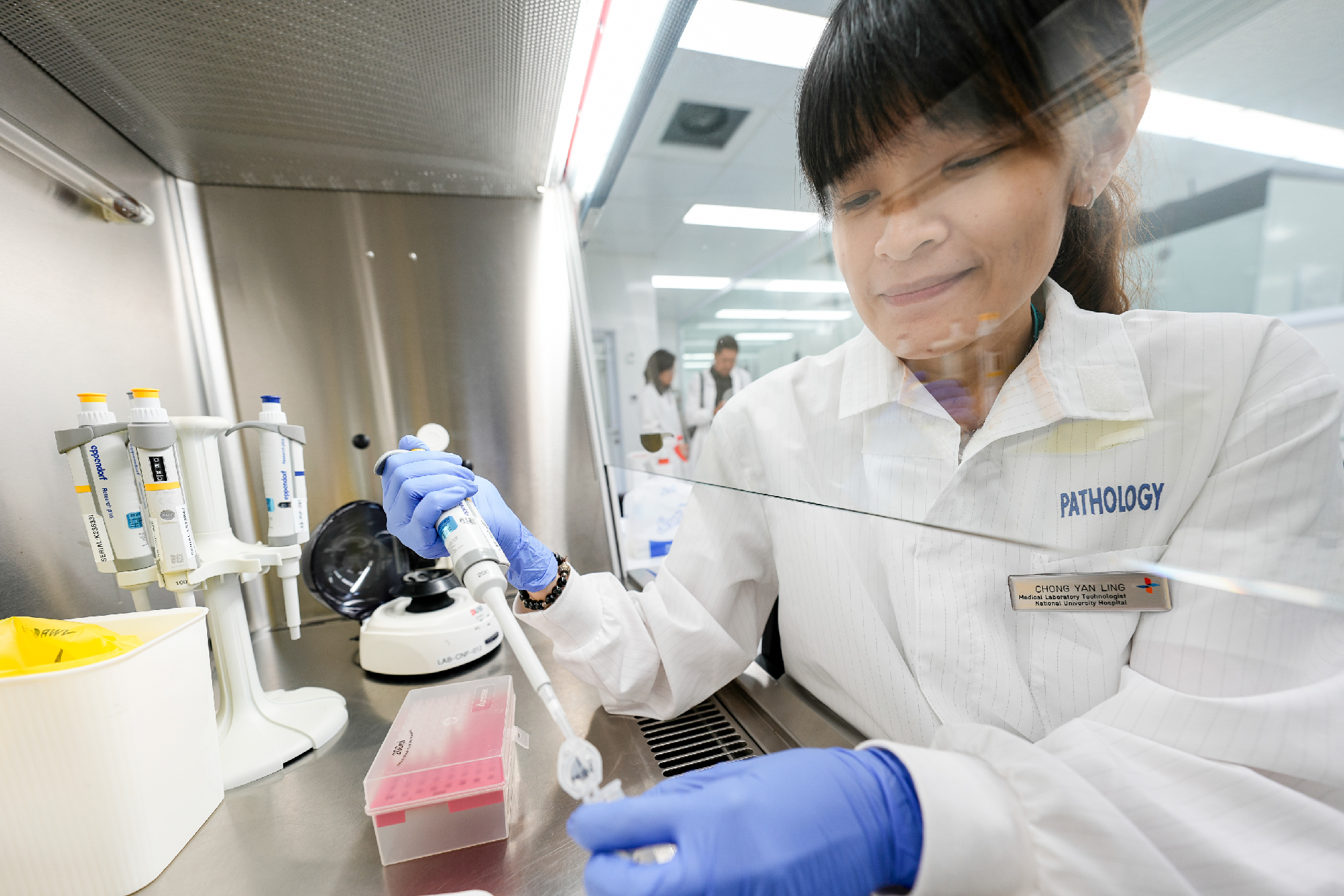NUH collaborates with Thermo Fisher Scientific and MiRXES to increase patient access to affordable,
advanced genomic testing for cancer in Singapore.
Issue 6 | September 2024

 Subscribe and ensure you don't miss the next issue!
Subscribe and ensure you don't miss the next issue!
No two cancers are the same. Even in those of the same type, each possesses a unique array of genetic nuances that influences how tumours grow, spread and respond to treatment.
Traditional cancer treatments, such as chemotherapy and radiation therapy, fight cancer by eliminating cancer cells with drugs and high-energy beams, respectively. However, the indiscriminate nature of these treatments means they also inadvertently play havoc with healthy cells, causing patients to experience a range of unpleasant side effects.
Eschewing the one-size-fits-all approach, genomic testing offers a more personalised solution: it zooms in on specific genes within tumours to help doctors identify targeted treatments that will work best against the cancer-causing culprits.
The National University Hospital (NUH), together with Singapore-based biotech innovator MiRXES and world-leading life science and clinical research company Thermo Fischer Scientific, signed a Memorandum of Understanding agreement on 14 June 2024 to formalise their commitment to jointly develop and clinically validate advanced, next-generation sequencing (NGS) genomic testing solutions and further cancer research.
Bringing genomic testing to a broader population
Access to affordable genomic testing for cancer remains limited in many Southeast Asian countries. Enhancing the local availability of rapid NGS genomic testing, which can profile multiple genes concurrently, enables healthcare providers to match patients with the most suitable therapies quickly.
NGS testing pinpoints genetic alterations in tumours that may respond well to targeted therapies. By focusing on specific molecular targets, these therapies block cancer growth while minimising damage to healthy cells.
“With NGS, we can detect a wider range of mutations that can be targeted by drugs, including rarer ones that would have been missed by traditional single-gene testing," says Dr Kenneth Sooi Wei Xiong, Associate Consultant, Department of Haematology-Oncology, National University Cancer Institute, Singapore. “This broadens treatment options, which improves the patient’s prognosis, while drastically reducing side effects.”
Singapore’s first public-private partnership centre for specialty molecular testing
In collaboration with MiRXES, NUH offers NGS testing at the newly opened NUH Diagnostic Molecular Oncology Centre (DMOC) @ Biopolis, co-located and integrated with MiRXES’ clinical laboratory, bringing together expertise and resources from both public and private sectors.
NUH DMOC @ Biopolis offers the APEX (Actionable, Personalised, Express) cancer treatment selection test, a state-of-the-art 50-gene targeted NGS panel. Currently, the laboratory provides NGS testing for four common cancers: non-small cell lung cancer, breast cancer, colorectal cancer and gastrointestinal stromal tumour. This list is expected to expand as new treatments become available.
“Not only does the NGS test detect actionable mutations that determine if the tumour is suitable for targeted therapy, but it also identifies most, if not all, of the resistant mutations that indicate the patient will not benefit from targeted therapy,” says
Associate Professor Tan Soo Yong, Head & Senior Consultant,
Department of Pathology, NUH.
From the lens of health economics, predicting the ineffectiveness of an expensive targeted therapy is just as crucial as determining the most suitable one — as it conserves valuable healthcare resources while guiding patients towards more effective alternatives.
“Our deep clinical expertise, combined with the cutting-edge advancements in biotechnology and research, will empower us to improve early detection methods and deliver even more precise diagnoses and treatments,” adds A/Prof Tan.
_____________________________________________________________________________________________________________________________
Like this article? Simply subscribe to make sure you don't miss the next issue of EnvisioningHealth!




















